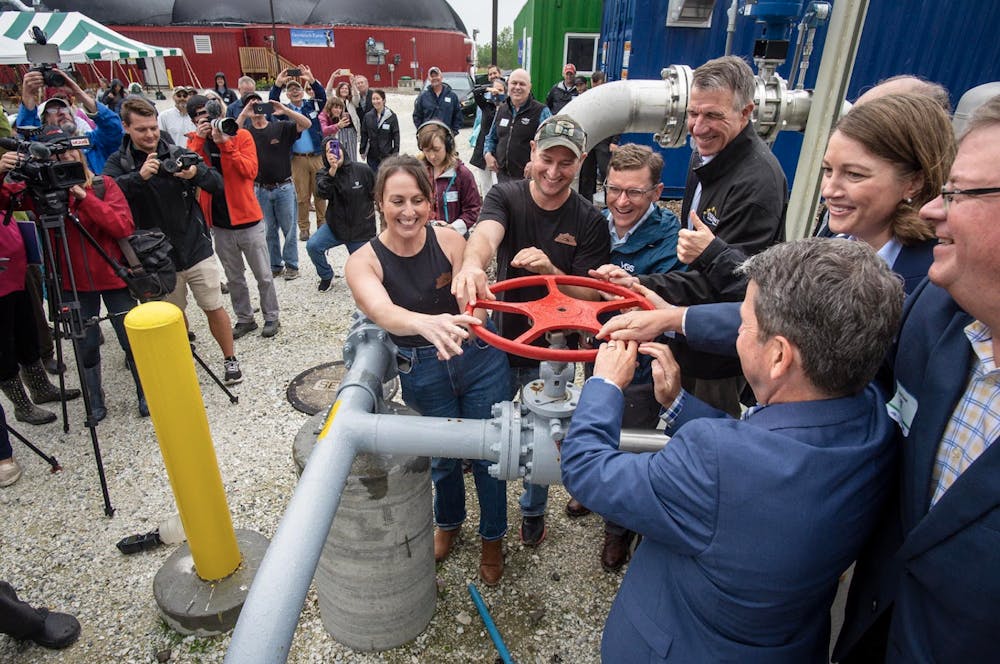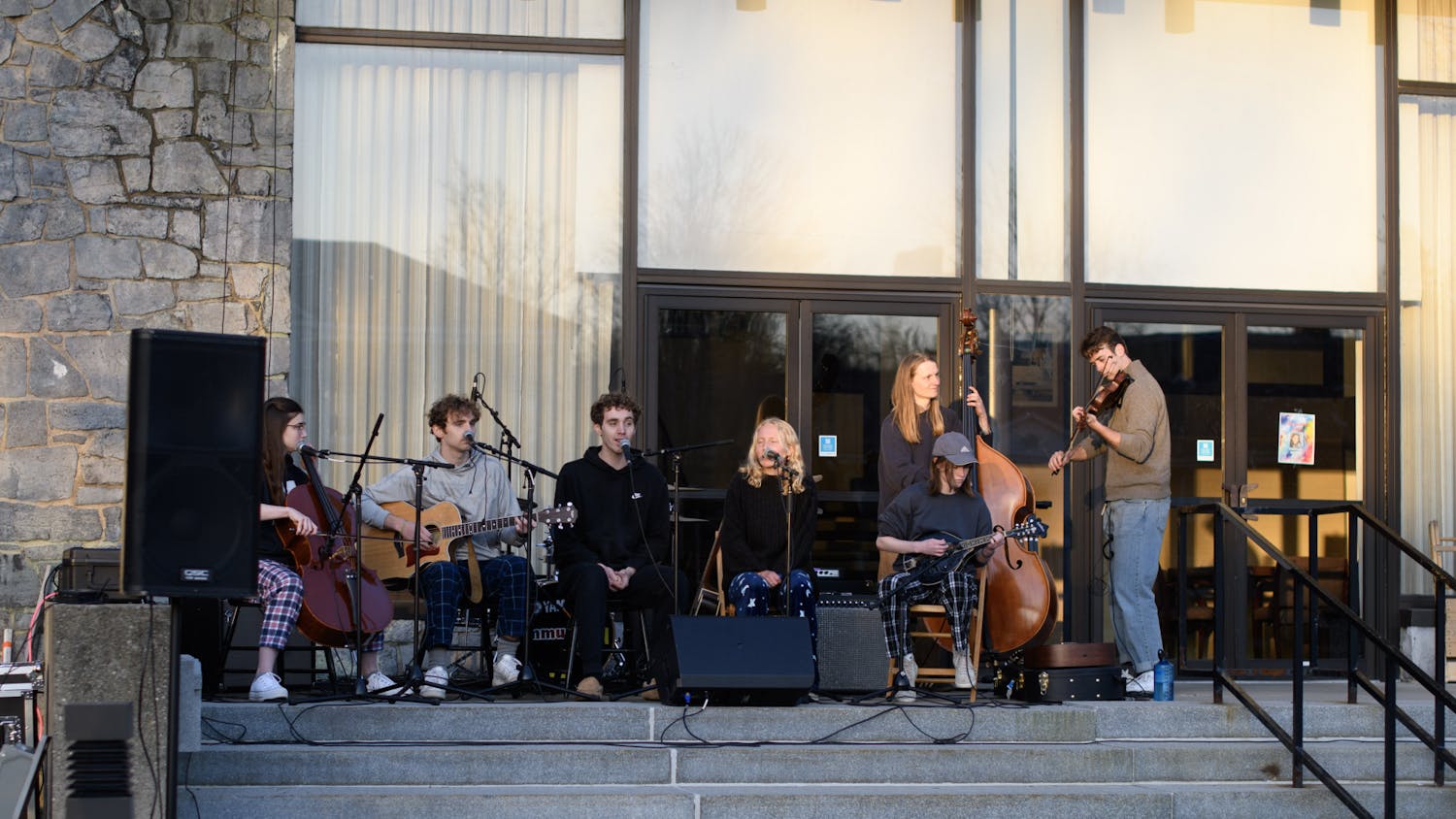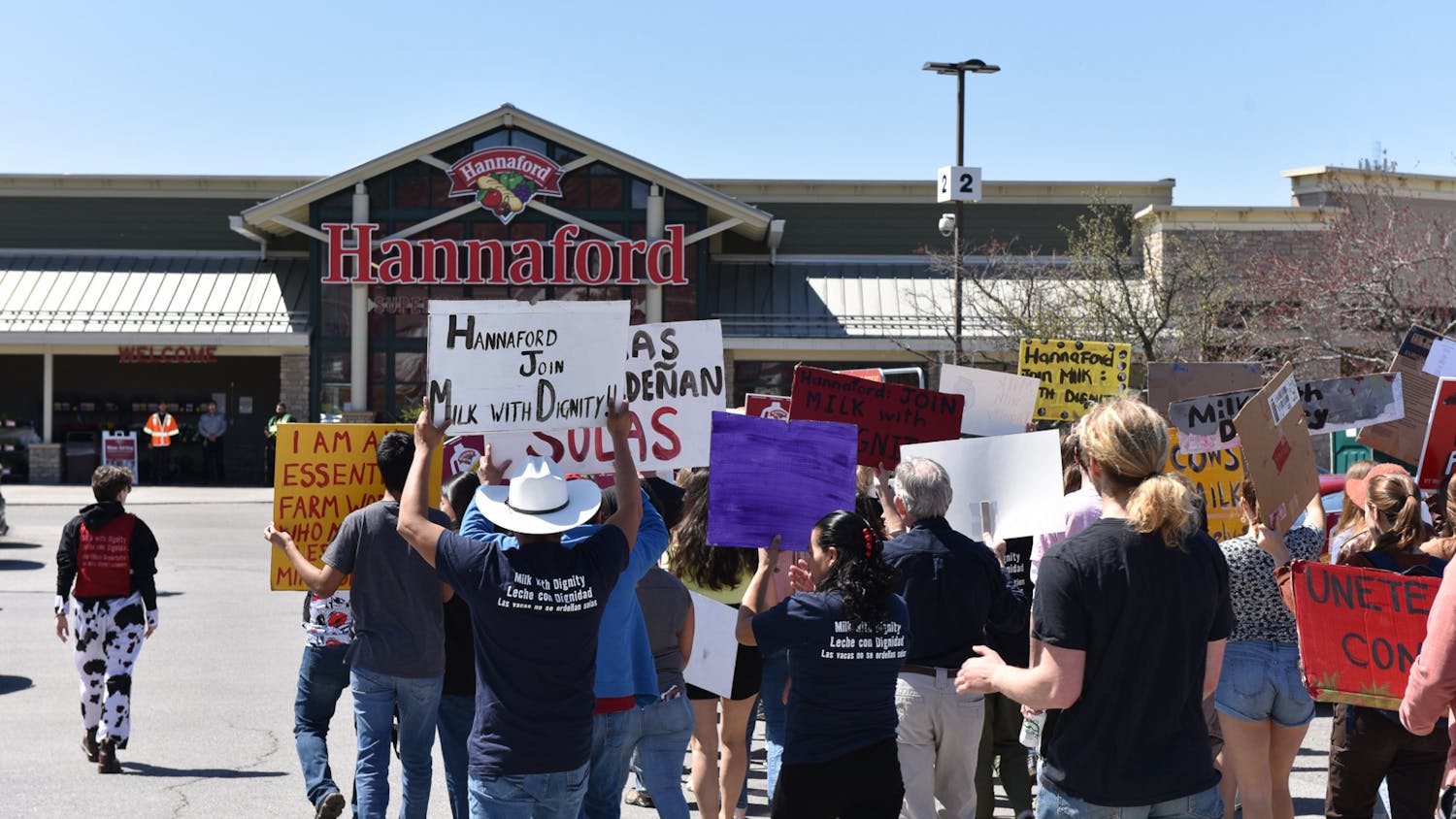The largest anaerobic biogas digester in the Northeast began production on Goodrich Family Farm in Salisbury on July 21. Standing beside Vermont Governor Phil Scott and Lieutenant Governor Molly Gray at the summer kickoff ceremony was the college’s executive vice president for finance and administration and treasurer, David Provost. Renewable natural gas produced by the digester will provide about one third of the energy that the college uses for heating and cooling — at the time, Provost called this partnership “critical” in helping Middlebury reach its renewable energy goals.
In remarks at the July 21 kickoff event, Governor Scott claimed the development as a victory for the state. “Think about it — we’ve got a Vermont farm, a Vermont utility, a Vermont college and national energy innovators all coming together to build a model for our region,” he said. “And it can be replicated in other parts of the state, and country, as well. This is truly transformative work that Vermonters can be proud of.”
But former workers at Goodrich Farm, activists and Middlebury students say that the celebration around the new biodigester is overlooking a long history of employment abuse and wage theft at the farm. Many of these workers contacted Migrant Justice, a Burlington-based migrant labor advocacy group, whose organizers said they assisted two former workers in filing Vermont Department of Labor complaints against the farm, though they later found no record of the second complaint after a public records request in June 2022. Allegations of withheld wages, retaliatory behaviors by employers and unsafe living conditions were leveled by former workers and Migrant Justice organizers who spoke with The Campus.
Development of the Goodrich biodigester project had been in the works since 2009, when, according to the college’s Director of Facilities Mike Moser, Integrated Energy Solutions connected the college with Goodrich Farm. Integrated Energy Solutions was the former developer of the project before Vanguard Renewables, the renewable energy company which now owns and operates the plant, joined the project in 2017. Ground finally broke on the plant’s development in 2019. Vanguard is responsible for the operations of the digester and pays an annual lease payment to Goodrich Farm.
The Campus spoke with Migrant Justice organizers, former Goodrich Family Farm employees, student activists and Middlebury College administrators about the history of the college’s relationship with the farm and the labor misconduct allegations that have surfaced in the last year and a half.
INITIAL ALLEGATIONS
After José Ramos was fired from his job at Goodrich in February 2020, the farm withheld the last week of his pay, a check worth around $600, according to Migrant Justice organizer Abel Luna. Ramos reached out to Migrant Justice, which offered to help him petition for his pay. In late February, Luna accompanied Ramos to the farm to request Ramos’ paycheck. Ramos only speaks Spanish, so Luna acted as his interpreter.
Luna said that, after arriving at the farm, the farm manager confronted him and Ramos and asked them to leave. The farm manager then told Ramos that he would not receive his paycheck and called Danielle Goodrich Gingras, one of the co-owners of the farm, according to Luna.
Luna asserts that Goodrich Gingras then ran into the barn, yelling at Ramos and demanding Luna and Ramos to leave the farm. According to Luna, Goodrich Gingras then repeated that she would not pay Ramos.
According to Luna, the situation then escalated. “She started getting a little bit violent. She closed the door on the barn, blocking both of us inside the parlor. And initially she started pushing José against the wall, you know, trying to hit him. And I managed to open the door again. We were in fear of our safety, basically.”
“When I managed to open the door, we both tried getting out,” Luna said. “But then the manager came rushing and running and then started to physically push us outside of the parlor. I got pushed forcefully out of the barn, and then José was next. They pushed him really hard, he came flying out of the door and he almost landed on the floor.”
Luna says that the two men tried to tell Goodrich Gingras that they wanted to have a peaceful conversation about the wages, but she threatened to call the police. Ramos got nervous at the possibility of law enforcement arriving, and the two men left.
Citing the traumatic nature of the event, Ramos declined The Campus’ request for an interview.
Chase Goodrich, who co-owns the farm with his sister Danielle Goodrich Gingras, declined to comment and instructed The Campus not to contact any other members of the farm.
On Feb. 29, 2020, following Luna and Ramos’ experience at the farm, Migrant Justice coordinated direct action on the farm with the goal of acquiring the withheld paycheck. The crowd of around 60 — including around 20 college students — was confronted by employees of the farm. On the day of the protests, signs displaying anti-immigrant language were positioned on the side of the road.
Thelma Gomez, an organizer for Migrant Justice, remembers a tense atmosphere, with members of the Goodrich family yelling at and threatening protestors.
Asa Skinder ’22.5, who was at the protest said members of the Goodrich family would walk to the edge of the farm’s driveway to accost protestors where they were picketing in front of the farm. Skinder also claims that farm vehicles exited and entered the farm without concern for the protestors in their way.
“I remember I had to jump backwards into a ditch with some other people because there was a massive farm truck,” Skinder said in an interview with The Campus. “It was pulling out [of the farm] not fast, just not trying to go around the people that were there. It was definitely a really intense scene.”
“My daughters were crying because [Danielle] was yelling at me and some people who were with the girls,” Gomez continued in Spanish remarks translated by The Campus. “They were super aggressive.”
As the situation escalated, Olivia Pintair ’22.5, who was attending the protest and who had previously worked with Migrant Justice, said that she ushered Gomez’s children into a parked car on the side of the road. “We were just sitting in the car on the side of the road, and this man from the farm had come up to us and screamed ‘f****** trespassing,’” she said.
“I think it was just really powerful to see this experience through kids’ eyes,” Pintair continued. “It was just pure emotion … Just to see the way that these farmers — who were so angry that we were there and didn’t believe that José deserved his wages — were just making kids cry.”
As the situation escalated, someone called the police. Addison County sheriffs then arrived, and Ramos eventually left without his paycheck.
After the protest, Ramos, with the help of Migrant Justice, filed a Vermont Department of Labor complaint alleging that Goodrich stole his last week’s wages. The Campus filed a Public Records Request for Ramos’s wage complaint with the Vermont Department of Labor. Due to 21 VSA 345a(h) which states that “information obtained from any employer, employee, or witness in the course of investigating a complaint of unpaid wages shall be confidential,” The Campus’ request was denied. A subsequent appeal by The Campus was also denied.
“It was definitely unfortunate, and I don’t think we handled ourselves well,” Chase Goodrich said about the incident when interviewed by VTDigger this past summer. “The only thing I can say is that that really does not speak to who we are. We care about our animals. We care about our people. We are family-first.”
Migrant Justice and Goodrich both confirmed that Ramos has since received his $600 paycheck.
Shortly after Chase Goodrich declined to comment on this story, Amanda Reinhardt, director of student activities at Middlebury, emailed the Campus’ Editor in Chief Riley Board, asking for Board to meet off-the-record with Erin Goodrich, Chase Goodrich’s wife, who also works in the Student Activities Office. As a student organization, The Campus is overseen by the Student Activities Office. This request was later retracted after Board suggested it might constitute a conflict of interest.
Both Erin Goodrich and Reinhardt declined to comment on the exchange.
After the February 2020 protest at Goodrich, five Middlebury students penned an op-ed in The Campus calling for the college to reconsider its partnership with Goodrich.
“I am very disappointed by how the college has handled the labor and human rights abuses at Goodrich Farm, but not surprised.” Jaden Hill ’22, one of the signatories of the op-ed, said in an email to The Campus. “The school has an incredible amount of power, especially financial power. We see this in their relationship with Goodrich Farm, both materially and symbolically.”
“The college probably should have known, most farms use migrant labor, and they should have looked into it,” Emma Ramirez-Richer ’22, a member of the college’s Environmental Council, said. “It would be naive of them to think that everything would be just perfect.”
Provost was not aware if the college had conducted any due diligence of their own.
When asked if the college had done any other investigation into working conditions at Goodrich prior to development of the plant, Provost clarified that the college has built a relationship with the Goodrich Family Farm over the last decade.
“We had people on the ground. Specifically doing an analysis on fair labor practices? I can’t speak to that,” Provost said. He said that there was no specific task list for this pursuit, but rather a general goal of assessing whether Goodrich was a “good partner.”
Jack Byrne, the college’s director of sustainability integration, said that Vanguard was the primary contact with Goodrich for the purpose of due diligence, and cited Vanguard experience working with 130 farms. “As [Vanguard] have put it, the Goodrich Farm passed their due diligence admirably,” Byrne said.
Byrne elaborated that, because the college has a contract to buy the natural gas through Vanguard, they are relying on Vanguard’s due diligence practices.
“For every farm that we work with, we go back through the labor records and we actually meet with the regulators in the state,” John Hanselman, founder and Chief Strategy Officer of Vanguard Renewables, said in an interview with The Campus. “To the best of my recollection, there were literally no prior incidents before Mr. Ramos made his allegations.”
Hanselman noted that farm labor is heavily monitored in Vermont, leading to confidence in the Department of Labor’s assessment. He also described other labor standards that Vanguard looked into, including comparisons of farmworker pay.
“The other thing that was intriguing to us was to compare and contrast the salaries of the farm workers versus some of the salaries of the college workers,” Hanselman said. “They get paid well on the farm.”
Hanselman views his relationship with the Goodriches in a positive light. “We see the Goodriches as really good stewards of the land, and I think very good employers of labor,” he said. “We’re on the farm, every day. We have people working on the farm. I’ve spent countless days on the farm. I’ve never seen or heard anything that wouldn't be exactly what we would want in a partner in terms of the way they work with their staff and employees.”
Provost says that the college has been in touch with the Goodriches following Ramos’ complaint and the ensuing protest.
“We felt very good about our evaluation and our conversations with them about their practices and their employee satisfaction of their workers, and concluded that they remain a good partner,” he said.
After Ramos’ complaint, the college did not speak with any workers or former workers at Goodrich Farm, according to Byrne.
“I don’t think that would have been appropriate for us to do, they’re their employees,” he said.
According to Jaden Hill and Olivia Pintair — two of the co-signatories of the op-ed — after the piece was published, its authors had a conference call with Byrne to discuss its contents. In a follow-up call with Byrne, Madeline Sharrow, a founding member of Migrant Justice, sought to open conversations with the college to discuss assisting the school in implementing fair labor practices formulated by Milk With Dignity at dairy farms the college is partnered with.
Milk With Dignity is Migrant Justice’s hallmark campaign, advocating for the enactment of a set of regulations to standardize living and working conditions for workers on dairy farms across Vermont. Ben & Jerry’s signed with Milk With Dignity in 2017, and the program covers 20% of Vermont’s dairy production.
“[Migrant Justice] shared their Milk With Dignity program, which is their main campaign,” Byrne confirmed. “I reviewed the program, and I appreciate the goals. I think the goals are good.”
But Byrne said he does not think it is appropriate for the college to pressure Goodrich to join the program, equating doing so with “tell[ing] them how to run their business.”
“[We’re] trying to get a better understanding of where there may be opportunities for the college and even this partnership to be able to help support [migrant farmworkers],” Byrne said. “It’s just not the single solution of Milk With Dignity that we think is the answer.”
As a result of the call between the student activists and Byrne, in fall 2020, a subcommittee of the Environmental Council was tasked with developing “a social justice and equity framework for Energy2028 implementation and Climate Action Capacity Project Collaboration.” In May 2021, the subcommittee described the college’s partnership with Goodrich Farm as one that needed to be reassessed and realigned “to more ethical standards.”
After the recommendations, interns worked on the framework over the summer and passed the work along to a steering committee that hopes to publish a draft of the recommendation in early 2022.
Byrne noted that student activism around the project has spurred his interest in learning more about Vermont’s migrant workforce and referenced a 2021 study written by University of Vermont Professor Bindu Panikkar and graduate Mary-Kate Barrett in which they partnered with Migrant Justice to survey the state of occupational health experiences of migrant dairy workers in Vermont. The paper concluded that wage theft is a concern for many workers and that many dairy workplaces provide inadequate health and safety measures.
According to Provost, Goodrich farm was chosen for the biodigester project because of its size within the Vermont dairy industry.
“It couldn’t be any local dairy farm. It had to be one that was fairly large,” Provost said. The Goodrich Farm is home to over 900 milking cows; by comparison, in 2019, the average number of cows per dairy farm in Vermont was 185. “For decades we’ve been dealing with failing Vermont dairy farms, so it was really in the spirit of: how could we help struggling dairy farms by finding alternative sources of use of their farms,” he said.
The college buys 55% of the ‘renewable natural gas’ (RNG) produced by the digester through Vermont Gas Systems (VGS), the state utility. Annually, the college will purchase 100 million cubic feet of RNG from the plant.
Provost stated that the college would not disclose the rate paid per cubic foot of RNG, but did note that the college is paying a premium for the fuel. Provost also noted that Middlebury’s early adoption of renewable energy goals have placed the college in a seller’s position in the renewable energy credit market.
The college will sell the gas credit through Bluesource, an emissions credits broker which will most likely sell to entities in California looking to satisfy the state’s cap-and-trade laws. Under these laws, entities who do not satisfy California's greenhouse gas reduction standards may purchase credits for renewable energy to meet requirements.
Moser clarified that the market the college would be participating in is the Renewable Identification Numbers (RINs) market. In this market, Bluesource would find a buyer for the college’s RINs, which are attributed to the RNG the college purchases from Goodrich Farm. Bluesource would then sell these RINs to entities looking to meet compliance requirements in their localities.
The college has not sold any credits yet, and, according to Provost, Bluesource is identifying potential buyers.
OTHER ALLEGATIONS
When Ramos spoke to Migrant Justice organizers in February 2020, he alleged a laundry list of abuses occurring at the farm. He claimed that managers paid him less than the minimum wage and subtracted repair costs for broken equipment from workers’ paychecks. Ramos also alleged that Danielle Goodrich Gingras was often verbally aggressive towards workers, and that worker accommodations were decrepit.
Allegations of inappropriate labor treatment are not recent developments. Another migrant worker interviewed by The Campus who worked at Goodrich Farm a decade ago has also alleged wage theft and labor abuses. In May 2021, he attempted to file a Vermont Department of Labor complaint alleging that the farm withheld his wages, though the Department said they had no record of such a complaint after De La Cruz Perez and Migrant Justice organizers submitted a public records request in June 2022.
Heberto De La Cruz Perez worked at the Goodrich Farm from November 2010 until sometime in 2011, when he fled the farm in the middle of the night after management told him that he and another worker would be responsible for paying for a $10,000 batch of spoiled milk. When he was working at the farm, De La Cruz Perez was using a different name.
De La Cruz Perez claims that during a shift he worked, a pregnant cow got in with other cows and was milked. Cows' milk in the last four months of their pregnancy cannot be consumed by humans, so this mix up spoiled the whole tank.
De La Cruz Perez alleges that the farm threatened to take $10,000 from the paychecks of him and the other worker for the lost value of the spoiled tank.
“We left because to pay $10,000 we would have had to work two or three months for them perhaps,” De La Cruz Perez said.“So the both of us left and we never returned.”
While this event was the reason for his departure from the farm, De La Cruz Perez’s wage complaint pertains to a different event. De La Cruz Perez said he worked 3 a.m. to 9 a.m. and 6 p.m. to 8 p.m. six days a week. One early morning, De La Cruz Perez crashed a skid steer into a gate on the farm and broke the gate. He alleges that in retaliation, the farm withheld his paycheck and that he did not receive any payment for the week.
After seeing Ramos’ complaint and protest, De La Cruz Perez felt motivated to also file a Department of Labor complaint, which he says he did in May of 2021 with the help of Migrant Justice.
“We didn’t have anyone to defend us. They did what they wanted and the only thing I could do was leave to not pay all of that money,” De La Cruz Perez said. “And when I saw [José’s case], I didn’t want anything by telling it, I just wanted the people to know what type of people they were and so that they also don’t forget all they did.”
Neither college employees Byrne and Provost, nor Hanselman, the Vanguard founder, said they were aware of De La Cruz Perez’s complaint.
“What we understand is there was one worker who was unhappy about his termination conditions, not his actual employment conditions,” Hanselman said. “[Ramos] didn’t like the way he was fired for non-performance.”
“It’s not surprising that over the course of the hundreds of employees that have been there, through the generations of ownership, there might be one unhappy worker upon his termination,” Hanselman said. “That’s probably not disturbing or shocking to us.”
Hanselman said that if they were made aware of any new issues with labor on the farm, they would look into them.
LOOKING FORWARD
Still, activists, students and former workers want the college to reconsider its partnership with the farm.
“We take so many moral stances at this college, and so many of them aren’t backed up,” said Ramirez-Richer, a student involved with the college’s Environmental Council. “I feel like that’s a pretty easy one. It’s right here in our community, in our neighborhood.”
“They’re not free from human rights abuses. They cannot say that they have nothing to do with that,” Luna continued. “They are also responsible for that. It is, in a way, their supply chain.”
Provost addressed the college’s role in the gas’ supply chain in relation to Energy2028.
“One of our struggles with Energy2028 is that we can do all these things about our sources of energy and our renewable efforts, our consumption of energy, but there’s so many components of it… that I can’t control,” Provost said. “So it’s, ‘What is the role of the college? And what is the role of us as individuals?”’
In an email to The Campus, Hill, one of the signatories of the op-ed, noted the tension between such praise for a new energy source and working conditions on the farm. “We are being celebrated, but all I see is privilege, complicity and a very dangerous precedent as we think about sustainability and safe, healthy human communities for the future. Listen to what many have asked for: introduce labor standards into your contract with Goodrich Farm to protect the rights of farmworkers, without whom this ‘renewable’ energy would not exist.”
Byrne said that the college’s pivot to sourcing local energy brought the realities of energy production closer to home. “When we were buying two million gallons of #6 fuel oil from the global fuel supply chain, we had no real sense of what it was attached to,” he said.
Pintair noted that the biodigester represents a large financial investment and partnership on behalf of the college. “I know there’s a lot of money tied up in this project… It seems, based on our conversations with Jack [Byrne] and based on what’s happening and what’s not happening, that the relationships between those powers are prioritized ahead of the ethics of what’s actually happening.”
De La Cruz Perez emphasized that his mistreatment at Goodrich was not an isolated incident.
“The truth is, in this world I don’t like to say anything bad or anything or wish bad upon anyone... I wasn’t the only one this happened to,” De La Cruz Perez said.
“They tried to cover the sun with their finger, as we say,” he continued. “But we really know what they’re like.”
Staff Writer Ariadne Will contributed reporting to this article.
Editor-At-Large Sophia McDermott-Hughes contributed translation to this article. The VTDigger article “The Northeast’s largest renewable natural gas digester begins operations in Salisbury,” which is cited multiple times in this article, was reported and written by McDermott-Hughes.
--
Correction 8/28/22: The original version of this story incorrectly stated that in May 2021, Heberto De La Cruz Perez filed a complaint with the Vermont Department of Labor (VDoL) against the Goodrich Family Farm alleging improper labor practices. Throughout the fall of 2021, De La Cruz Perez and Abel Luna repeatedly told the Campus in interviews and email correspondence that a VDoL complaint against the farm was filed in the spring of 2021. Similarly to Ramos’ complaint, the Campus was unable to verify this information with VDoL due to laws that prohibit anyone but the employer or submitter to obtain a labor complaint regarding unpaid wages. According to Migrant Justice organizer Will Lambek, a June 2022 public records request by De La Cruz Perez revealed that the VDoL has no record of any labor complaint under De La Cruz Perez's name. According to Lambek, Migrant Justice staff member Thelma Gomez met with De La Cruz Perez at his house in May 2020 and filled out a VDoL complaint on her personal laptop; all involved parties were under the impression that the complaint had been successfully filed. This story has been updated to reflect the correct attribution of information pertaining to De La Cruz Perez's complaint.

Jake Gaughan is an Editor at Large.
He previously served as an Opinion Editor and News Editor.




